| Srl | Item |
| 1 |
ID:
100246
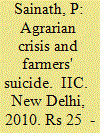

|
|
|
|
|
| Publication |
IIC, New Delhi, 2010.
|
| Description |
18p.
|
|
|
|
|
|
|
|
|
|
|
|
Copies: C:1/I:0,R:0,Q:0
Circulation
| Accession# | Call# | Current Location | Status | Policy | Location |
| 055466 | 630.92/SAI 055466 | Main | On Shelf | General | |
|
|
|
|
| 2 |
ID:
054379
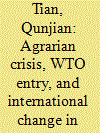

|
|
|
| 3 |
ID:
105156
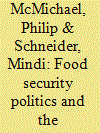

|
|
|
|
|
| Publication |
2011.
|
| Summary/Abstract |
This article reviews proposals regarding the recent food crisis in the context of a broader, threshold debate on the future of agriculture and food security. While the MDGs have focused on eradicating extreme poverty and hunger, the food crisis pushed the hungry over the one billion mark. There is thus a renewed focus on agricultural development, which pivots on the salience of industrial agriculture (as a supply source) in addressing food security. The World Bank's new 'agriculture for development' initiative seeks to improve small-farmer productivity with new inputs, and their incorporation into global markets via value-chains originating in industrial agriculture. An alternative claim, originating in 'food sovereignty' politics, demanding small-farmer rights to develop bio-regionally specific agro-ecological methods and provision for local, rather than global, markets, resonates in the IAASTD report, which implies agribusiness as usual ''is no longer an option'. The basic divide is over whether agriculture is a servant of economic growth, or should be developed as a foundational source of social and ecological sustainability. We review and compare these different paradigmatic approaches to food security, and their political and ecological implications.
|
|
|
|
|
|
|
|
|
|
|
|
|
|
|
|
| 4 |
ID:
074186
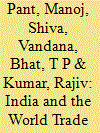

|
|
|
| 5 |
ID:
023770
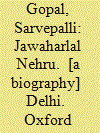

|
|
|
|
|
| Publication |
DelhI, Oxford University Press, 1976.
|
| Description |
398p.Hbk
|
|
|
|
|
|
|
|
|
|
|
|
Copies: C:1/I:0,R:0,Q:0
Circulation
| Accession# | Call# | Current Location | Status | Policy | Location |
| 015530 | 923.254/GOP 015530 | Main | On Shelf | General | |
|
|
|
|
| 6 |
ID:
100817
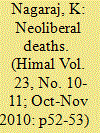

|
|
|
| 7 |
ID:
132910
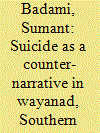

|
|
|
|
|
| Publication |
2014.
|
| Summary/Abstract |
This article demonstrates how highly-politicised assessments of agrarian distress have affected professional and public perceptions of the causes of suicide, specifically in the region of Wayanad, north-eastern Kerala. Because of a bifurcation between purely sociological and purely psychological analyses of suicide, current mental health policy downplays socio-economic factors and actively promotes specifically psychiatric analyses of victims and their families. Yet, for the sake of political representation in the public sphere, sociological analyses facilitate the construction of discursive categories relating to farmer distress.
The article shows how this has meant that the struggles of certain underprivileged groups, specifically the indigenous Paniya community, are thereby rendered invisible. Moving beyond the existing dualistic approaches, field-based research findings also demonstrate the potential to see suicide as a form of communication that provides important counter-narratives to the dominant discourse about suicides in South Asia.
|
|
|
|
|
|
|
|
|
|
|
|
|
|
|
|